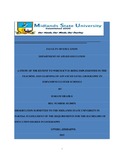Please use this identifier to cite or link to this item:
https://cris.library.msu.ac.zw//handle/11408/2107| Title: | A study of the extent to which ict is being implemented in the teaching and learning of advanced level geography in Empandeni cluster schools | Authors: | Harani, Sibahle | Keywords: | Information communication technology Geography |
Issue Date: | 2015 | Publisher: | Midlands State University | Abstract: | The purpose of this study was to study the extent to which ICT is being implemented in the teaching and learning of Advanced level Geography in schools in the Empandeni cluster. The main focus of the study was to highlight major factors affecting the implementation of ICT in the teaching and learning of Geography at Advanced level and to give solutions to address the challenges. A mixed approach design was used to get in depth detail of the extent to which ICT is being implemented in schools. In depth open ended and closed questionnaires were distributed to seven Geography teachers in the cluster schools. Interviews were administered to 37 Advanced level Geography pupils from three different schools in Empandeni cluster. The study revealed that teachers lack skills on implementing ICT in Geography lessons, the time allocated to e-learning is little, high cost, internet connectivity, shortage of infrastructure such as computer labs, computers, ICT tools are major factors affecting the implementation of ICT in Geography lessons. The study looked at solutions to improve the implementation of ICT such as training of teachers, procurement of ICT facilities such as computers, construction of computer labs, and use of alternative sources of power. The observations made the researcher to conclusively say that the integration of ICT in Geography is far much behind, hence the need for the concerned stakeholders to fully support this programme. It was recommended that the national policy on ICT must be readily available and it should be clearly communicated to schools, curriculum should be in line with e-learning facilities so that subjects can be taught through e-learning collaborative tools, schools that are not electrified to seek for help so that they can have other sources of power and schools with limited computers may allow pupils who can afford to buy their own laptops and other ICT facilities to use them. | URI: | http://hdl.handle.net/11408/2107 |
| Appears in Collections: | Bachelor Of Education Honours Degree In Geography |
Files in This Item:
| File | Description | Size | Format | |
|---|---|---|---|---|
| harani.pdf | Full Text | 1.33 MB | Adobe PDF |  View/Open |
Page view(s)
216
checked on Jan 20, 2026
Download(s)
84
checked on Jan 20, 2026
Google ScholarTM
Check
Items in MSUIR are protected by copyright, with all rights reserved, unless otherwise indicated.



